
Reggae is a music genre that originated in Jamaica in the late 1960s. The term also denotes the modern popular music of Jamaica and its diaspora. A 1968 single by Toots and the Maytals, "Do the Reggay", was the first popular song to use the word reggae, effectively naming the genre and introducing it to a global audience. Reggae is rooted out from traditional Jamaican Kumina, Pukkumina, Revival Zion, Nyabinghi, and burru drumming. Jamaican reggae music evolved out of the earlier genres mento, ska and rocksteady. Reggae usually relates news, social gossip, and political commentary. It is instantly recognizable from the counterpoint between the bass and drum downbeat and the offbeat rhythm section. The immediate origins of reggae were in ska and rocksteady; from the latter, reggae took over the use of the bass as a percussion instrument.

Norman Quentin Cook, also known by his stage name Fatboy Slim, is an English musician, DJ, and record producer who helped to popularise the big beat genre in the 1990s. In the 1980s, Cook was the bassist for the Hull-based indie rock band the Housemartins, who achieved a UK number-one single with their a cappella cover of "Caravan of Love". After the Housemartins split up, Cook formed the electronic band Beats International in Brighton, who produced the number-one single "Dub Be Good to Me". He then played in Freak Power, Pizzaman, and the Mighty Dub Katz with moderate success.

Lee "Scratch" Perry was a Jamaican record producer, composer and singer noted for his innovative studio techniques and production style. Perry was a pioneer in the 1970s development of dub music with his early adoption of remixing and studio effects to create new instrumental or vocal versions of existing reggae tracks. He worked with and produced for a wide variety of artists, including Bob Marley and the Wailers, Junior Murvin, The Congos, Max Romeo, Adrian Sherwood, Beastie Boys, Ari Up, The Clash, The Orb, and many others.
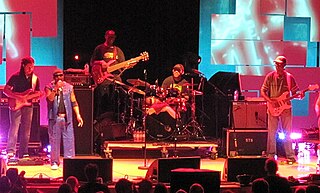
The Maytals, known from 1972 to 2020 as Toots and the Maytals, are a Jamaican musical group, one of the best known ska and rocksteady vocal groups. The Maytals were formed in the early 1960s and were key figures in popularizing reggae music.

Asian Dub Foundation (ADF) is an English electronic music band that combines musical styles including rap rock, dub, dancehall, ragga, and South Asian music. The group also includes traditional rock instruments such as electric bass and guitar, which acknowledges a punk rock influence. Their music is known for its dub-inspired basslines, guitar parts inspired by the traditional Indian instrument the sitar, and fast rapping.

Skindred is a Welsh band that fuses heavy metal with other genres, most notably reggae. Formed in Newport in 1998, they are well known for their energetic and involving live performances and have won several awards including "Best Live Band" at the 2011 UK Metal Hammer Golden Gods Awards and the "Devotion Award" at the 2011 Kerrang! Awards.

Dennis Bovell is a Barbados-born reggae guitarist, bass player and record producer, based in England. He was a member of a progressive rock group called Stonehenge, who later changed name and became the British reggae band Matumbi, and released dub-reggae records under his own name as well as the pseudonym Blackbeard. He is most widely known for his decades-spanning collaborations with Linton Kwesi Johnson.

Easy Star All-Stars is a reggae collective founded in 1997 by Michael Goldwasser, Eric Smith, Lem Oppenheimer and Remy Gerstein of New York City-based Easy Star Records. The band is known for its reinterpretations of classic albums in reggae style. Their first album, released in 2003, was Dub Side of the Moon, an interpretation of Pink Floyd's 1973 album Dark Side of the Moon. This was followed by Radiodread (2006), an interpretation of Radiohead's 1997 album OK Computer;Easy Star's Lonely Hearts Dub Band (2009), an interpretation of the Beatles' 1967 album Sgt. Pepper's Lonely Hearts Club Band; and Easy Star's Thrillah (2012), an interpretation of Michael Jackson's 1982 album Thriller.
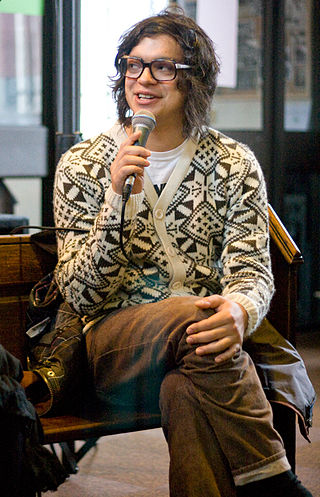
Sam Duckworth is an English musician who performs as Get Cape. Wear Cape. Fly. He is also sometimes referred to as Get Cape, Cape, GCWCF and Slam Dunkworth. According to Duckworth, his original stage name came from Retro Gamer magazine, from an article about superhero games such as Batman containing the heading "Get Cape. Wear Cape. Fly", although a Calvin & Hobbes cartoon by Bill Watterson has also been cited. In addition to the Get Cape name, and his given name, Duckworth has released music under the moniker Recreations.

Colin Patrick Harper, better known by his stage name Collie Buddz, is a Bermudian reggae artist best known for his single "Come Around".

Homegrown is the sixteenth studio album by English reggae band UB40, released on 3 November 2003 through Virgin Records and DEP International. The follow-up to Cover Up (2001), the album was produced by UB40 at DEP International Studios in Birmingham. Described by Robin Campbell as an old-fashioned UB40 record, Homegrown features both love songs and political numbers. As with Cover Up, its use of programmed rhythms was the cause of musical differences in the band and was later criticised by frontman Ali Campbell.

Rebelution is a reggae rock music band formed in Isla Vista, California. The current members of Rebelution are Eric Rachmany, Rory Carey, Marley D. Williams, and Wesley Finley. Each member attended and completed school at the University of California, Santa Barbara.

Black Roots are a roots reggae band from the St. Paul's area of Bristol, England, formed in 1979. They toured extensively in the UK and Europe in the 1980s and early 1990s releasing several albums and singles during that time before disappearing from the music scene for about ten years. Their comeback began when Soundicate/Makasound, a record label in France, released an album in 2004 and followed it up with another in 2007. In December 2010 they performed their first live show for some twenty years at the Trinity Hall in Bristol and since then they have been active once again, playing live dates and releasing a new album.
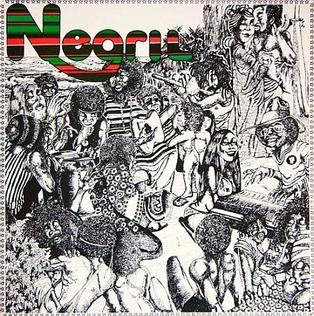
Negril is an album released in 1975 from a session produced, arranged, and almost entirely composed by guitarist Eric Gale. It includes some of Jamaica's best-known musicians of the time. The album expresses Gale's fondness for the beach and natural beauty of the Jamaican seaside village Negril, which became a popular destination for tourists.
Giant Panda Guerilla Dub Squad is an American reggae and jam band from Rochester, New York, founded in 2001 and known for their live performances and authentic roots reggae and dub sound.
Soothsayers are a London-based band who performs and records original Afrobeat and reggae-influenced music. Formed in 1998 by saxophonist Idris Rahman and trumpeter Robin Hopcraft, they have released five studio albums and a number of vinyl singles on their own label Red Earth Records.

Easy Star Records is an American independent record label founded in 1996. Based in New York City, the label primarily produces and releases albums in the genres of reggae and dub.
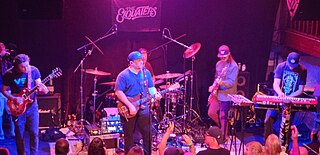
The Elovaters are an American, Boston-based American reggae rock band, that formed in 2014.
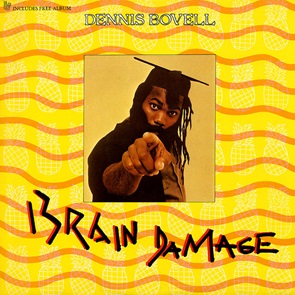
Brain Damage is the third studio album by Barbadian-British reggae musician Dennis Bovell, released in 1981 by Fontana Records. His first solo album under his own name, following two dub albums released as Blackbeard, it was Bovell's first recording at his South London-based Studio 80. Having begun to feel that reggae had not progressed as much as he would have liked, he conceived Brain Damage as an attempt to fuse the genre with numerous rhythmic styles from Europe, America, Africa and the Caribbean to highlight the genre's flexibility. The musician intended not to explore the international rhythms in a standard way but to take them to what he perceived as musical extremes. The direction was also inspired by the wide array of people in his audience.
















